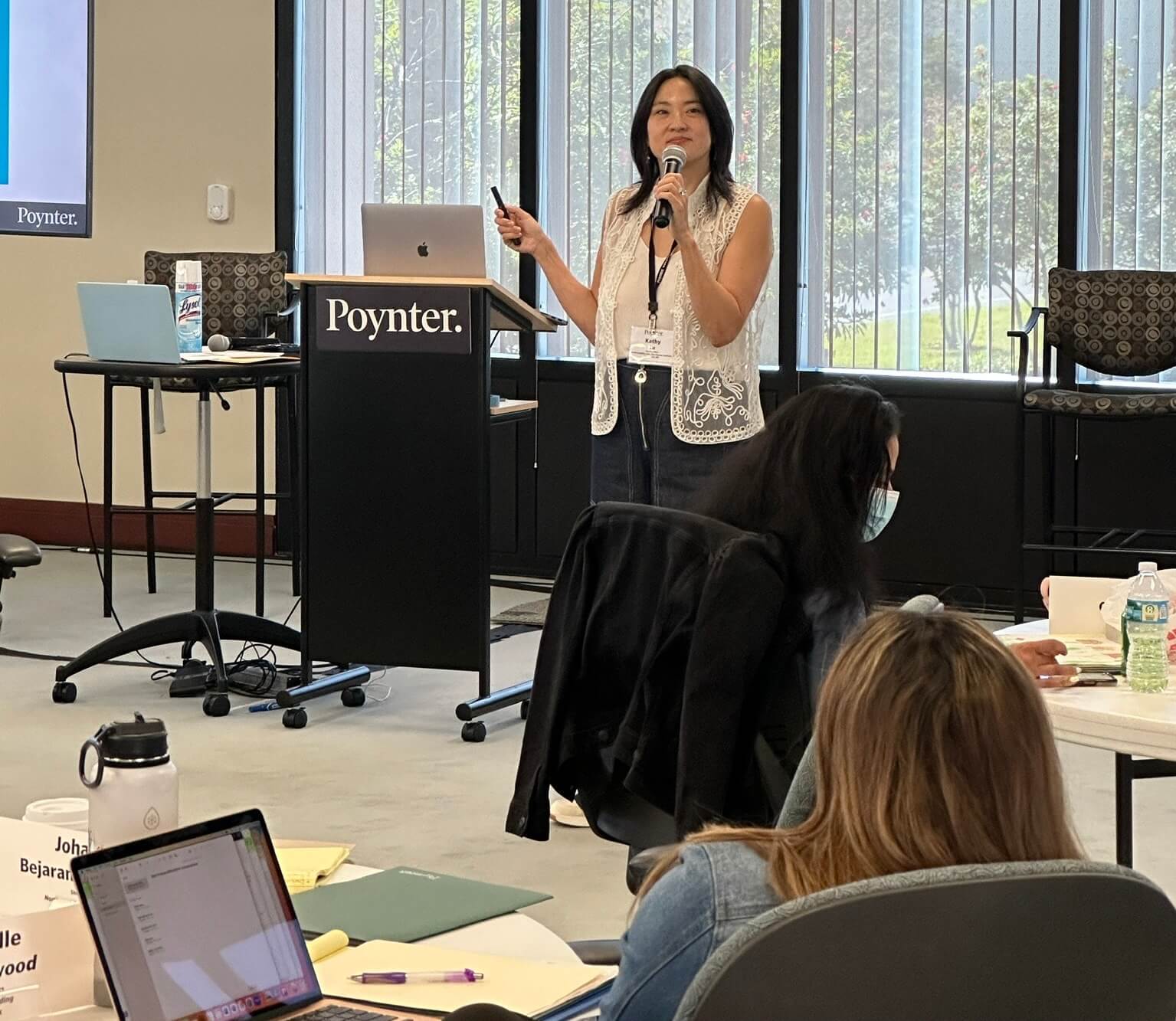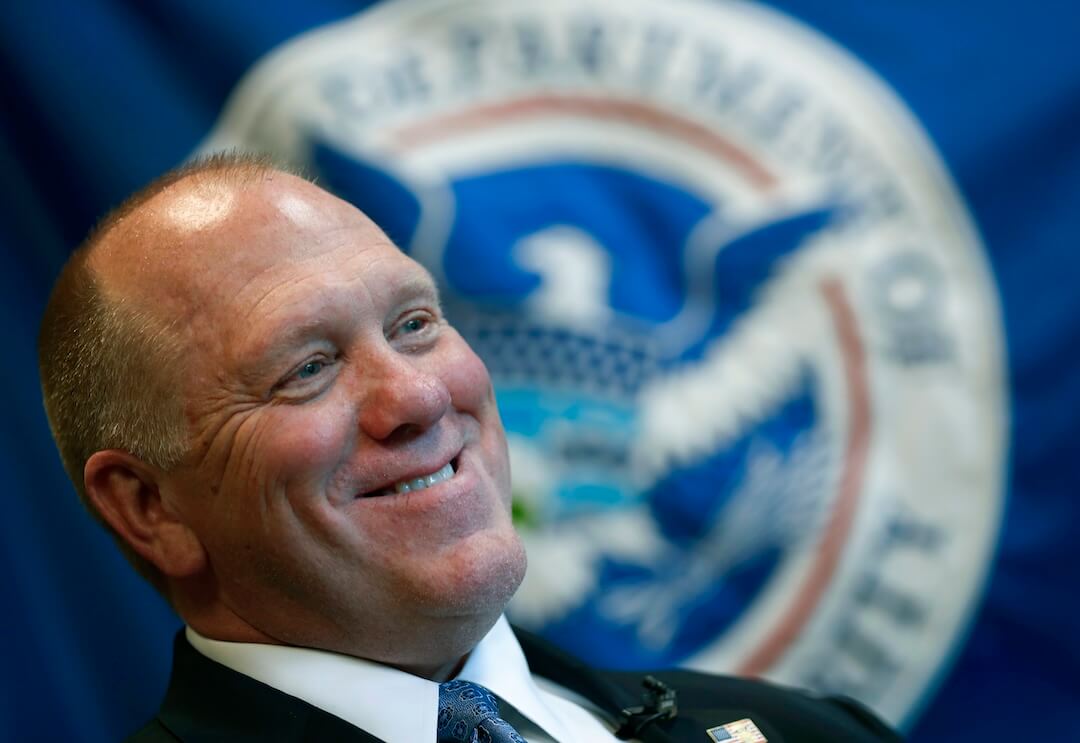The Poynter Report is our daily media newsletter. To have it delivered to your inbox Monday-Friday, click here.
Next week is Thanksgiving, so this is the perfect time to think about what we’re thankful for when it comes to the media. Me? I’m thankful I get to read the incredible work done by my three favorite newspapers: The New York Times, The Washington Post and my hometown Tampa Bay Times. But I want to hear from you: What in journalism are you thankful for? Reply to this newsletter or send your thoughts to news@poynter.org. I will put the best in next Tuesday’s Poynter Report.
OK, so maybe there’s a little fatigue …
What a week.
Impeachment hearings dominated the news with a sprinkling of Democratic presidential debate mixed in.
Are you now exhausted by all the coverage? TV numbers hint that maybe you are.
It’s important to note that viewership numbers depend on lots of factors. Judging weekday television viewing of breaking news is almost impossible. Some people who want to watch are unable because they are working. Some might be able to watch some weekdays, but not others because of work schedules.
But the fact is, TV numbers for the impeachment testimony have declined each day for the first four days of testimony. (Thursday’s numbers will come in today.) Day one had an average of 13.79 million. Then the next three days slipped to 12.7 million to 11.4 million to another 11.4 million.
Is that fatigue? Or is it another factor? Again, hard to say.
What is not hard to say is viewers appear to want spin with their testimony. Fox News, which most believe to lean right, and MSNBC, which most perceive to lean left, are the most-watched networks for the debate. Fox News leads all networks, including an average audience of 2.5 million on Wednesday. MSNBC was next with 2.35 million.
That’s a little anecdotal evidence that suggests viewers might be more interested in hearing what they want to hear than getting the straight dope. (Although of course both Fox News and MSNBC will swear they are giving viewers the real deal, but those of us who tune in at night know that is not the case.)
One more note about the TV numbers. While Fox News and MSNBC battle for the top spot and tend to have way more impeachment viewers than the major networks (CBS, ABC, NBC) and CNN, it’s actually NBC that has the best viewership of those aged 25-54. On Wednesday, that age bracket averaged 419,000 viewers. The next closest was Fox News with 404,000.
TVNewser has a good breakdown of all the TV impeachment numbers.
Everyone’s a winner!
Democratic presidential candidate Cory Booker, Tulsi Gabbard and Amy Klobuchar during the Democratic presidential primary debate Wednesday. (AP Photo/John Bazemore)
Who won the debate?
That’s actually a dubious question after any debate because there is no right answer. For many, chances are, whichever candidate you like the best probably did well, while those you dislike had bad nights.
And as Democratic presidential hopeful Joe Biden recently told The Atlantic, “These aren’t debates. These are one-minute assertions.”
Still, we have to have a scorecard at the end of it, don’t we? If so, then a good place to go is The New York Times opinion section. That’s because the Times has not one, but 10 of its columnists and opinion writers grading the performance of each candidate.
Cool graphics rank the candidates from 1-10, with 1 being the worst and 10 being the best. That, along with quick-take analysis, allows viewers to get a more full and balanced take on the night. Each candidate ends up with an average score, but the graphic also shows the disparity between the opinionists.
For example: One person gave Elizabeth Warren a 3, while another gave her a 9. Bernie Sanders got a 10 and a 4. Joe Biden got two 8s, but also a 3.
It’s a good read, and a really cool way to answer the impossible question: Who won the debate?
Debating myself on this debate
Maybe Wednesday’s long day of impeachment testimony wore everyone out. Wednesday night’s debate was the least-watched Democratic debate this year. The average audience for MSNBC’s coverage was about 6.6 million, according to Nielsen. Not counted in those numbers are those who watched on The Washington Post’s website or NBC’s streaming services and websites.
According to CNN’s Brian Stelter, the average viewership for the October debate on CNN was 8.5 million. The second night of the very first Democratic debate in June has been the most-watched. That debate on NBC, MSNBC and Telemundo averaged 18.1 million viewers.
Three things that popped into my head during this week’s impeachment coverage:
-
Fox News deserves credit for its daytime impeachment coverage, especially Bret Baier who hasn’t been afraid to call it as it is, as you can see in this clip here.
-
Why doesn’t Fox News get credit for fair impeachment coverage? Because of the primetime crew of Sean Hannity, Tucker Carlson and Laura Ingraham who are doing what makes them so popular to their viewers, which is defending the president.
-
The real-time coverage by the Washington Post, New York Times and Wall Street Journal has been beyond impressive. The sheer insider knowledge of their reporters built through years of experience has set their coverage far ahead of everyone else.
Calling an audible at The Player’s Tribune
Derek Jeter. (AP Photo/Wilfredo Lee, File)
It has been an eventful week for former baseball star Derek Jeter. His name appeared on the Baseball Hall of Fame ballot for the first time, the first step in what surely will be his induction into the hall next year. But Thursday, he made a major move with the website he created — The Players’ Tribune, which tells the story of athletes in the first person.
Jeter is calling it a “partnership” with Minute Media, but TheBigLead.com, which is owned by Minute Media, said Minute Media “has acquired” The Players’ Tribune.
In his note to readers, Jeter wrote, “Most things won’t change: my involvement as a founder, as an active member of the Board of Directors, and most important of all — this being a platform that is built on trust. We will continue to operate independently, powered by Minute Media’s technology and global scale.”
CNN reports that the site’s traffic has struggled of late, ranking 69,757 in the United States over the past 90 days, according to Amazon.com Inc.’s Alexa. Earlier this month, Digiday’s Max Willens broke down the site’s troubles in a story called “What Went Wrong For The Players’ Tribune.”
How malfeasance goes unchecked
This is a troubling — and completely accurate — opening paragraph from a New York Times story written by Julie Bosman:
“School board and city council meetings are going uncovered. Overstretched reporters receive promising tips about stories but have no time to follow up. Newspapers publish fewer pages or less frequently or, in hundreds of cases across the country, are shuttered completely.”
These are the realities of local journalism, which has reached a crisis stage. A report released this week by PEN America found that as local journalism declines, “government officials conduct themselves with less integrity, efficiency, and effectiveness and corporate malfeasance goes unchecked. With the loss of local news, citizens are: less likely to vote, less politically informed, and less likely to run for office.”
The survey goes deep inside the issues of declining local journalism. The big question, of course, is how do we fix it? The report stated:
“Given the scope and scale of the problem, a solution is unlikely without dramatically expanding public funding for local journalism.”
100 episodes and going strong
I recently was a guest on the 100th episode of WriteLane, a podcast about journalism and storytelling hosted by one of the best storytellers in the business — Pulitzer Prize-winning reporter Lane DeGregory of the Tampa Bay Times — and Times deputy editor Maria Carrillo. For my episode, we talked about my list of the best journalism movies of all time.
Now check out DeGregory’s story on Poynter.org about what she has learned about podcasting and what makes her podcast enjoyable and successful.
Hot type
Joe Biden. (AP Photo/John Bazemore)
- The best thing you’ll read all day: The Atlantic’s John Hendrickson talks to Joe Biden about a topic both men can relate to — stuttering.
- What does corruption actually look like in Ukraine? And what is it like to be the country on the other end of the impeachment story? That’s the latest episode of NPR’s international podcast “Rough Translation.” Host Gregory Warner follows a newly elected politician there.
- They knew he was a convicted abuser and yet they sent him to work with some of the most vulnerable children in the world. CNN’s Nima Elbagir, Barbara Arvanitidis, Katie Polglase, Bryony Jones and Alex Platt with “How a Catholic Order Dedicated to Protecting Children Failed Them.”
Next week’s Poynter Report
Editor’s note: Next week, Tom will be out of the office, and the Poynter Report will take a break after Tuesday for the Thanksgiving holiday. But we want to hear from you — what journalism or journalists are you thankful for this holiday season? Reply to this newsletter, send an email to news@poynter.org or tag us on Twitter. We’ll publish some of your responses next week. Thanks for reading!
Have feedback or a tip? Email Poynter senior media writer Tom Jones at tjones@poynter.org.
Upcoming Poynter training:
- Leadership Academy for Women in Media (seminar). Deadline: Nov. 30.
- Investigating Jails (free self-directed course). Open now!
Want to get this briefing in your inbox? Sign up here.







